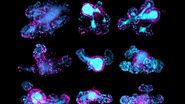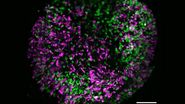Key Learnings
- How to use microfluidics to ensure the supply of constant fresh nutrients and gases to cells during imaging while also removing the waste products of cell metabolism.
- How to observe the effects of changes in shear stress and nutrient density and see how cell growth may be altered compared to static cultures.
- Discover how commercially available turn-key microfluidic systems can be combined with Mica to optimize cell health over long term imaging.
Speakers

Dr. Lynne Turnbull, Principal Scientist - Leica Labs @ EMBL Imaging Center
Lynne is a Principal Scientist at Leica Microsystems. She received her PhD in Sydney Australia in cardiac biophysics and undertook postdoctoral training in San Francisco and Melbourne. Lynne’s research interests shifted to bacterial biofilms and motility, and she used different types of imaging to explore and understand how bacteria build communities and move through their environment. Upon moving to the University of Technology Sydney, Lynne established and managed the Microbial Imaging Facility. Lynne joined GE in 2016 to provide application support throughout Asia for super resolution microscopy. Since 2021 Lynne has been with Leica Microsystems based in the labs at the EMBL Imaging Center in Heidelberg.

Dr. rer. Nat. Michael Loser, Applications Specialist - ibidi
Michael is a Life Science Sales & Applications Specialist for ibidi. He studied biology at Mainz University with the focus on neurobiology, microbiology and genetics. After his studies, he worked as a scientific assistant at the Department of Neurobiology, Munich, where he gained a PhD. The main focus of his PhD was the embryonic development of the central complex in locust brains. After his PhD, he worked in a clinical lab in Munich. In 2018, he joined ibidi to support customers with their scientific projects.





